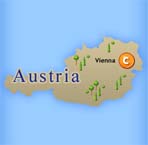Researchers in Austria turn wood into natural gas
 Vienna- While Austria tapped into its natural gas stocks amid the recent stoppage of Russian gas supplies, engineers in the Austrian town of Guessing were busy producing an alternative: natural gas from wood.
Vienna- While Austria tapped into its natural gas stocks amid the recent stoppage of Russian gas supplies, engineers in the Austrian town of Guessing were busy producing an alternative: natural gas from wood.
With the help of Swiss and Austrian scientists, the European Centre for Renewable Energy Guessing produced so-called synthetic natural gas for the first time outside a laboratory in December.
"One big advantage of this process is that this method can extract synthetic natural gas from renewable natural resources," said Christian Keglovits, the spokesperson of the centre that is located in a rural area in eastern Austria, some 10 kilometres from the Hungarian border.
The process of turning trees into gas is done in two stages. First, wood chips are made into gas at a temperature of 900 degrees. In a second step, this gas is converted into methane that can be used to heat homes or fuel cars.
Currently, the pilot facility in Guessing can turn 360 kilograms of wood into 120 cubic metres of gas within an hour - the energy equivalent of 120 litres of heating oil or 1,200 kilowatt hours. As the town does not have a gas heating system, the product is used for cars that run on natural gas.
The Austrian 1-megawatt plant is too small to turn a profit, said Alfred Waser at the Paul Scherrer Institute in Villigen, Switzerland, which developed the technology together with scientists at the Vienna University of Technology.
There is already interest from Sweden and Germany for larger facilities up to a capacity of 100 megawatts. "We assume that we enter an economically interesting range starting from 10 megawatts," Waser said.
But the gas plants should not be too big, either. Scientists and engineers involved in the project want to avoid building plants that would be so big that they would cause more traffic from trucks bringing in wood from further away.
In Guessing, the energy centre takes care to use only old or sick trees from the surrounding forests for its gas production, and not wood that is grown for other purposes.
Synthetic gas is unlikely to become a full alternative to supplies from Russia and elsewhere, experts in Austria and Switzerland said. In Switzerland, around 10 per cent the country's primary energy could be produced with man-made gas if all available biomass such as animal waste, surplus wood or grass cuttings were used, Waser said.
But Keglovits said the technology would help to make his small community of 3,800 less dependent of foreign suppliers. "It will make us independent from Russian natural gas to some extent, because we can draw on our local resources," he said.
The gas crisis might also help the European Centre for Renewable Energy Guessing win additional research grants, Keglovits said. The funds might also help one of the centre's other projects: turning wood into liquid fuel for cars. (dpa)